DESIRE TO BE/IN PROXIMITY/TO OKAYNESS: On Sarah Dowling's DOWN
BY Divya Victor
In which I talk about reading DOWN & Sarah Dowling talks about making DOWN
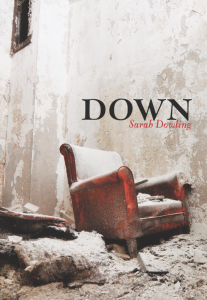
Divya: Reading DOWN
“Cause when I open my mouth
My whole heart comes out” – Christina Aguilera, “Sing For Me
My heart is in my pocket mouth; it is poems by Pierre Reverdy Sarah Dowling.
I’m always a little late for things. I wore Little-miss-Sunshine tiny-tees a year after they stopped being cool, I got rid of my sharkie-clips well after I really should have, I didn’t know the month’s hit #1 single until it dropped to the bottom 20. This is because I am an immigrant and being an immigrant means you are belated, always. It takes you longer to unpack the suitcase and open up attachments to new Billboard charts or find your way around the new mall or find new people to pinkie swear with—the building blocks of teen life events, really.
In particular, I was always too late to learn the lyrics to the pop song worming its way into everyone’s ear. So, while girls belted out that week’s hit, I was still stuck in another chorus of another time—my voice trailing theirs or mumbling the tails of lyrics: belated.
I never sang my heart out with them.
I thought about this belatedness, this vocal trailing off, as I read Sarah Dowling’s forthcoming book DOWN, which is being published by Coach House Books this Fall. The book seems to ask how a subject flounders, fails to pick up the lyre in time, remains belated and on the outskirts of the social chorus. Much of the book has the semantic and structural effect of a mangled mixtape—one that has been reconstructed, loop by loop, after its magnetic innards have spooled out.
The books’ conceptual hinge spins on the pun between being down and being down for something. “I’m sorry, I’m feeling down” vs. “Sure, I’m down for that” are antithetical affects of two oppositional states—depression and elation; social exclusion and inclusion.
It tries to get down.
It can’t get down.
It is down.
This is the opening poem:
I’VE GOT TO TELL YOU
Can you Can you Can you Can
I promise you If we talk and you know
But see
I don’t know if that’s
you shouldn’t tell but if
If I let you You can’t I’m talking Are you
noiseless I’m not lonely just Is it, Is it Say yes
or say no Cause I really Tell me are
you wet Oh
Boy Won’t you If you tell you know
that we shouldn’t let you but
If I let You can’t tell I’m proud I hope
I’m not Is it, Is it Cause I really
Tell me are you that
somebody listen Cause I really Tell me are
you can’t
tell I’m talking it’s difficult I
hope I’m not lost Is it, is it
Say Is it Cause I really Tell me are you that
somebody Cause I really You can’t
tell I’m talking further
The poem seems to recap, reiterate, split and splice a stripped Aaliyah song (feat. Timbaland) “Are You That Somebody”— but everything is wrong in it, everything is wrong with it. The chorus is shuttered, the hooks are interrupted, the refrains are muddled, the levels are off.
What does it mean to be truly off the charts? Out of tune?
DOWN is composed of unintuitive typographical invasions, frisked phrases, and unrelenting enjambment. The breathless adumbration of syncopated shards of lyric break the time-signatures I used to know. Its composition produces discomposure.
As a replacement for the song, Sarah has given me a poem.
DOWN is, as Mina Loy mourned, chansons sans chansons.
Throughout Sarah’s book, familiar lyrics are refracted into stuttering and continually interrupted phrases. I am continually, compulsively, thwarted away from singing along; I have no access to the circuit of pleasure that I used to hum myself into. She keeps stripping my favorite songs.
What can make me feel this way? I used to know—it’s My Girl. I used to know the mathematics of the amorous relation:
Sunshine > Cloudy Day
Cold Outside ≤ Month of May
The Amount of Honey I’ve Got > The Amount of Honey Bees Have
Riches, Money, Fame ≤ My Girl
My Girl and talking about My Girl > Everything
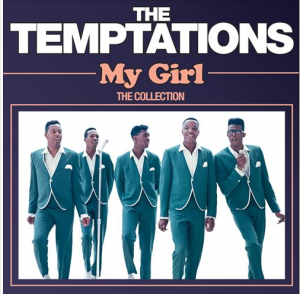
But, in Sarah’s poems, the melodic balm of The Temptation’s “My Girl” is now a tumbleweed tangle of desperate questions, unsolved problems, inexorable desperation and worry. It has become an anxious Gordian knot. For every fret on the lyre, it frets.
What can make this matter. What can make me feel us. Make me feel this method. What can make attention to excesses. What can make explicit disarray. What can make a relentless course we must do. Make me feel the very aesthetics expressed or implied. What can make me feel this in their lives of talking. This way that one inherently I, or thing. This way, not sexless, never sexless. Would that it were. This of us, by many. Make me feel this and any energy, for us and for it.
Sarah’s episodic shattering of familiar songs bookends a central crisis— the infamous Starlight Tours. Despite its beguiling name, the “tours” are the non-sanctioned police practice of moving and abandoning marginalized persons outside the margins of the city. Starlight Tours have targeted, in particular, indigenous populations and have resulted in freezing deaths in Saskatoon. The core of the book, then, is concerned about the inclusion and exclusion of subjects from communal definitions—those who can sing along gets along.
If you’re not down with the law; if you’re down on your luck; if you must be kept down; if you’re not down, you’re down.
Pop culture has often described freedom from inhibition, fear, and nervousness with the image of someone getting down and ‘singing their heart out.’ At the heart of singing your heart out is the anxiety about inclusion and exclusion—can you sing along? can you get along? Singing your heart out means fighting off your demons, getting on that stage, and letting it rip, girl. It means successfully corralling community into a choral orgy of shared identity. The visual cues of mouths wide open: 32 ceramic clusters wide open for transference; uvulas high-fiving every other uvula in sight.
DOWN cannot get along.
DOWN refuses to get along.
DOWN cannot belong.
DOWN cannot sing its heart out.
Singing your heart out is the absolute apex of successful communal fabrication and the sign that you have mastered social inclusion. It is the climax of the Road Trip movie; it is the Coming-of-Age bedroom-solo; it is deciding to join in the Rom-Com snow-dusted caroling; it is not giving a damn and Getting Your Groove back on girl’s night out, because you’re Diane Keaton, goddammit. Or, you’re Julia Roberts (for whom there Ain’t No Mountain High Enough!) This vocal expenditure displaces the work of community formation onto the sentimental organ—the chatty heart, after all, will go on and on. Singing your heart out means that you’re free to be who you want to be along with every other person who can be who they want to be with you together forever.
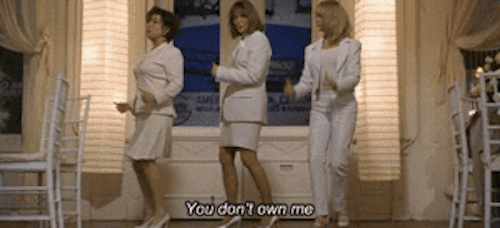
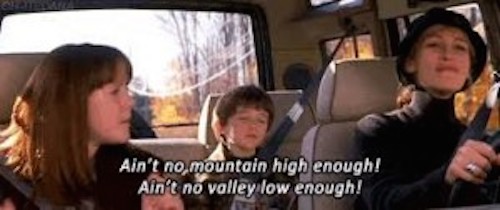
The familiar scene of singing your heart out is what Lauren Berlant has identified as an intimate public of “woman’s culture,” complete with a effusive bloc of consumers that keeps songs in circulation through memorization, recitation, replay, rewind, replay, undo those updos and lets do some shots, ladies!
The mouth out of which the heart falls is the central ornament of a feminine intimate public. It is a veritable market place where identities are exchanged; where forms of empathetic discourse are refined; where power hierarchies are glossed and botoxed; where the fantasy of belonging to a certain gender can be snapped into place like a prosthetic bridge.
DOWN is not in this mouth.
DOWN is not sung in this tongue.
DOWN cannot belong.
DOWN refuses the kind of Karaoke-I’m OK-You're OK- of public commiseration in the privacy of song lyrics hummed while doing dishes, driving in the car, putting on mascara. One hums into the culture of circulation to construct commonalities between women—as if, through the consumption and recitation of the pop song, the subjects become, as Berlant has described, “emotionally literate in each other’s experiences of power, intimacy, desire, and discontent with all that entails.” The “hygienic” community of the sing-along/get-along variety worries me because of the “vagueness of affective fantasy” that we knot our tongue into; because of an undergirding compulsory drive ‘to be in proximity to okayness’ with each other.
But these poems disallow this “okayness with each other”; disallow the comforts of singing along. In lieu of singing one’s heart out, Sarah’s poems approach a very different method of living heart to mouth.
Sarah’s syntax and rhythmic syncopation palpitate—your heart is raising in your body because it is racing. The poems, in performance, produce a heart-in-mouth sensation: a physiological flutter of palpitations during which the subject feels the organ beat in her mouth or caught in her throat and throbbing as if it’s trying to vault out. This is a product of sympathetic overdrive—a cluster of symptoms associated with anxiety, fear, nervousness around strangers, and nervousness around oneself. The nervous heart is the one on the brink of failing or fleeing. The poems palpitate—they touch gently; they pat the abrupt muscle; they skip a beat. This is the syntax of nerves; the poetics of anxious sympathetic overdrive; the belated lyric.
Sarah: Making DOWN
I’ve been working on DOWN since 2009. It began as different project, Hinterland B.
For years, I was writing about a big, bare field. There was a body in it. The newspapers said that someone was gone. The newspapers said that someone had been found. These were not the same person. The TV kept on chattering. I was thinking about this field as secondary, not Hinterland A, but Hinterland B.
I thought that the hinterlands were the most rural and remote places. Turns out, this is not true. A hinterland is more familiar; the waste fields around ports and airports are hinterlands. A hinterland is a kind of buffer between the sanctioned spaces for living and working and the trade hubs where we are not supposed to go. They are the regions between our everyday centers and the truly rural lands that we too-often imagine as depopulated.

I was thinking about what takes place in these in-between areas. I was thinking about hinterlands as locations of secret pleasure and concealed terror. Invisible, off to the side, that hard, uncultivated and often contaminated ground seemed to hold the possibility for a strange coalition. I wondered what connections might be forged in discarded space.
Bernadette Mayer asks that we review Frank O’Hara’s statement, “What is happening to me, allowing for lies and exaggerations which I try to avoid, goes into my poems.” The field was happening to me, but not directly. I usually pictured the field as somewhere in Saskatchewan, where I am from. I haven’t lived there in almost fifteen years.
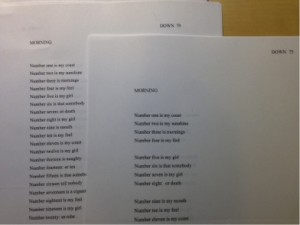
At the same time as I was working on Hinterland B, I was also working on performance writing using song lyrics. I liked how the repetitions structuring chorus and verse shifted when stripped of their melodic accompaniment. Gertrude Stein said she was inclined to believe there is no such thing repetition, only insistence. This was insistence but with more anxiety. That was happening to me. I was interested in the ways these lines became so tense and upset. But they also set off funny little moments of recognition.
It was hard to learn how to use these kinds of words: tell me you want me; tell me you need me; tell me something good; tell me what you want to hear; tell me baby; tell me you love me; tell me why. What I say at the end of the book is that I was trying to write a text caught between being completely poignant and completely flattened. I wanted to write in the language of pop songs, a language for love and one that I did not yet speak. I wanted a text whose insistent borrowings would not slide into critical superiority and hauteur. I wanted to do it over and over again, machine-like but utterly sincere.
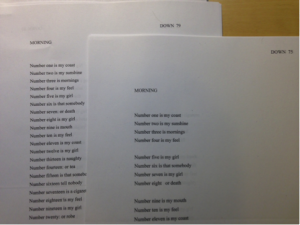
To my surprise, I saw that the words in these two projects overlapped: the same hawks flew across the pages. Everything came back to the birds and the bees. It was all the tension between telling and not telling. I put the two together.
In this way, DOWN became a book about likeness. Andy Warhol said that “everybody looks alike and acts alike, and we’re getting more and more that way.” Is this what is happening? I wanted to put that in tension with the things that aren’t liked, the things relegated to the hard-packed field. There is a kind of wager here: Can we take these languages and make the connection, flatten them all the way till we’re living in the same environment?
The field says we already are. But let’s get there.

Sarah Dowling is the author of Security Posture, Birds & Bees, DOWN, forthcoming from Coach House Books in fall 2014. Her critical work has appeared in American Quarterly, GLQ, Signs and elsewhere. Sarah's poetry is included in the anthology I'll Drown My Book: Conceptual Writing by Women, and she is international editor at Jacket2. Originally from Regina, SK, Sarah resides in Seattle and teaches in the University of Washington Bothell's MFA in Creative Writing and Poetics.
Divya Victor is the author of CURB (Nightboat Books, 2021), winner of the 2022 PEN Open Book Award and...
Read Full Biography

